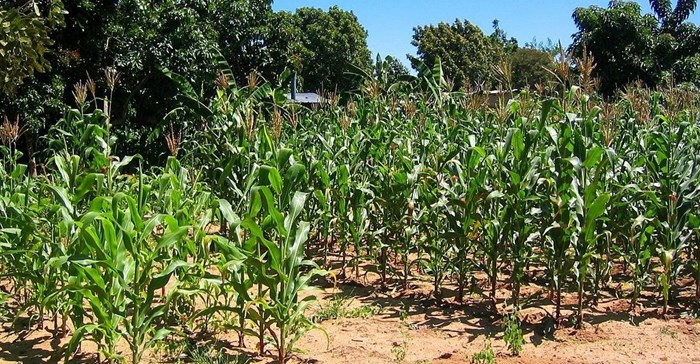ZAKA, ZIMBABWE Under the scorching Zimbabwean sun, cattle seek shade among stunted thorn bushes in the drought-prone district of Zaka, where crops wither due to increasing temperatures and changing weather patterns. Severe lack of rain across Southern Africa has hit the country hard, with government officials saying a quarter of the population faces starvation. Many villagers are forced to survive on wild fruit.
Maize, the country's traditional staple crop, has suffered a series of poor harvests. Late rains this year again wrecked the planting season, and the little that is growing has often been destroyed by heat. It may not help the immediate crisis, but science is providing a glimmer of hope for smallholder maize farmers in Zimbabwe.
Hybrid maize seeds
The International Maize and Wheat Improvement Center - known by its Spanish acronym CIMMYT - is conducting trials in Zaka on hybrid maize seeds adapted to tackle drought and high temperatures. The seeds are developed to survive dry conditions with 60 percent less water than normal and in temperatures of up to 35 degrees C (95 degrees F), according to CIMMYT researchers.
"If we get these new maize seed varieties, that will help us a lot," said Ceaser Chavizha, a small smallholder in Zaka, located in Masvingo province, south of the capital Harare.
Like many farmers in the region who rely on maize produce, Chavizha has been forced to survive on food handouts as his crops have been reduced to dried husks. "We cannot continue with handouts as we have fields that we can work on to produce food for our own, so we hope the new maize seeds will help us improve our yields," he told AFP.
El Niño-induced drought wrecked arable fields
Maize meal crops are ground and turned into mealie meal, used to make porridge and other food, but the El Niño-induced drought has wrecked arable fields, grazing pastures and water sources.
The drought scourge is high on the agenda at UN COP22 climate talks in Morocco, where world leaders and experts are discussing how to implement the landmark Paris Agreement that was signed last year. The pact aims to cap global warming at below two degrees Celsius (3.6 degrees F), compared with pre-industrial levels.
Once referred to as the breadbasket of Africa, Zimbabwe used to be an exporter of maize, but now aid organisations say the country requires about two million metric tonnes a year to feed itself.
Developing long-term sustainable agriculture
Cosmos Magorokosho, a senior scientist and maize breeder at CIMMYT, said the ultimate goal of hybrids was to help farmers develop long-term sustainable agriculture. "Basically it means transferring genes from one plant to another type so that you create a new type that has the characteristics that you want," he said.
He said CIMMYT had received $500,000 funding from USAID to develop the new maize variety for drought-prone areas in East, Central and Southern Africa. Magorokosho stressed that more funds were needed to extend the project, and criticised the Zimbabwe government's delay in adopting new maize hybrids. "There is a layer of testing that is required by the authorities which is a little bit long... we would wish it is shortened so that the varieties can get quickly to the farmers," Magorokosho said.
CIMMYT, a non-profit research project headquartered in Mexico, is also working on a vitamin A-rich maize variety which is already in production in other parts of Africa and Latin America.
This year, Zimbabwe's cash-strapped government declared a "state of disaster" in most rural areas, with at least 2.4 million people in urgent need of food aid. Sekai Makonese, another small-scale farmer in Zaka, welcomed the potential impact of scientific intervention, saying she was counting on hybrids becoming widespread as soon as possible.
"Long ago, we used to farm maize with no problems but now we have a problem with climate change and now our crops fail before we harvest," she said.
The Zimbabwe government is yet to approve the mass distribution of the seeds, but the product is already available at some agricultural outlets.
Source: AFP






































